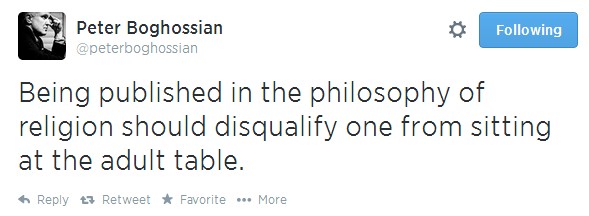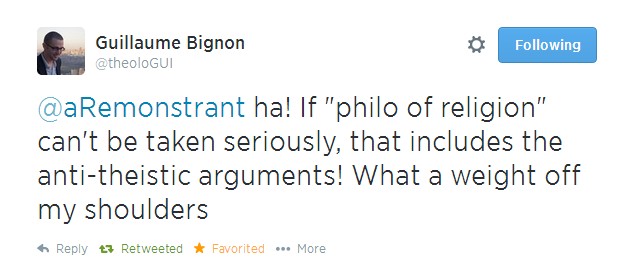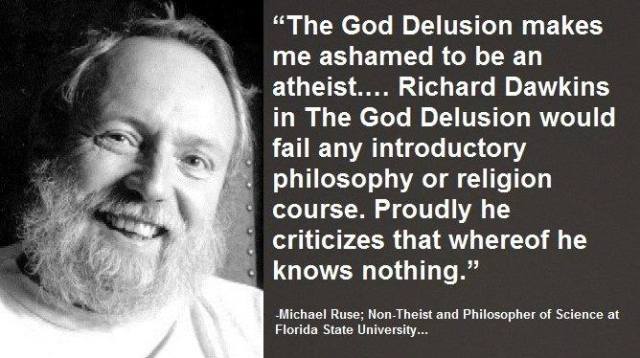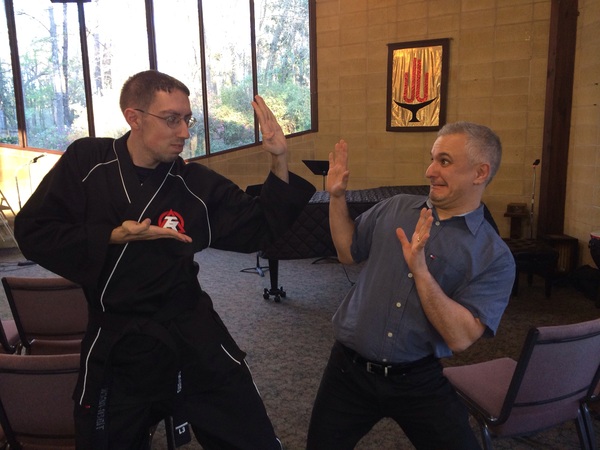This was a recent tweet by Peter Boghossian:
My replies were:
His reply was… nothing.
There are, of course, many other great atheist / agnostic philosophers who could also be mentioned (people such as Bertrand Russell, Anthony Flew, John Mackie and more recently Stephen Law [1] to name a few) but one thing appears very clear – Boghossian thinks he deserves to be at the adult table while all these (fine) philosophers deserve to be on the kid’s table.
Now, the obvious question ought to be: On what basis do you say that Peter? I mean, how on earth could he attempt to invalidate all the people professionally published in the subject he is most interested in – philosophy of religion?
Now if that’s not child-like, I don’t know what is! Even then that’s insulting some children I fear!
Anyway it looks like we could be in the last few days of Peter Boghossian on theology since in a recent interview [2] he has claimed he’s getting “burned out by atheism!” It would not surprise me in the slightest if Boghossian quickly walked away from the subject of theology and philosophy of religion given how radically he is ignored by academics and given the devastating criticisms made of his work in this area and his inability to respond to serious criticisms made of his work.
He complains that he cannot manage to get theologians to attend his lectures but those of us involved in theology and philosophy of religion who have responded to him online have had absolutely no response whatsoever to our criticisms. It appears if you cannot physically get to a Boghossian lecture and sit in one of those seats he’s going to pretend you don’t exist at all. And now it looks like he could be the one to run away from the subject before answering his critics directly. I cannot say I’m too surprised.
I loved the response from this atheist turned theist philosopher:
Contrast this attitude of Boghossian’s with a paper on the subject in the philosophy magazine ‘Philosophy Now’:
“To conclude, the prospects for philosophy of religion look brighter than they have done for many moons. The general standard of discussion in the analytical philosophy of religion is high – in my judgment, as high as in any other branch of philosophy. It is also provoking much interest both amongst professional philosophers in other fields (David Lewis and Martin Davies, for instance, have both written articles on the philosophy of religion) and amongst students taking philosophy at university (at Oxford, philosophy of religion is the second most popular optional subject, after philosophy of mind). In addition, it is a lively, interesting and accessible area, whose questions are surely relevant to all (don’t atheists need to consider the arguments for God, and perhaps provide some reasons for their rejection of theism?). If you would like to study it, there are many easy ways into the academic subject, and I feel sure that it will amply repay your time and attention.”
Daniel Hill What’s new in… Philosophy of Religion ‘Philosophy Now’
Here is the atheist philosopher Nicholas Everitt expressing a very different perspective of this academic discipline as he begins his book on the subject:
“When I was a philosophy student, I once told my tutor that I would like to write an essay on the existence of God. ‘My interest in my maker ceased when I read Hume’s ‘Dialogues’, he loftily replied, leaving me in no doubt that my interest should be similarly short-lived. I never wrote the essay, but nor, in spite of Hume’s ‘Dialogues’, did I lose the interest. Since those distant days, the philosophy of religion has enjoyed a remarkable renaissance. In those bad old days, with a few honourable exceptions, it was dominated by the woolly pieties and crass objections of third-rate thinkers. Since then, the field has been taken over by by imaginitive, creative thinkers who are themselves cutting-edge contributors in other areas of philosophy. These philosophers have brought with them an array of the sharpest weapons in the armoury of analytic philosophy. This combination of able thinkers and sophisticated techniques has transformed the field in the last few decades.”
“The topic of God is a huge philosophical river junction, a confluence into which flow streams from metaphysics, the philosophy of mind, epistemology, the philosophy of science, moral philosophy, and the philosophy of logic, and of course from the history of philosophy.”
Nicholas Everitt The non-existence of God pp.xiii, xiv (emphasis mine)
Or atheist philosopher Michael Martin:
“However, as I pursued my graduate education in philosophy at Harvard I specialized in the philosophy of science, not the philosophy of religion. The former seemed vital and fresh, the latter dead and uninteresting. It seemed to me quite clear in the light of the evidence that disbelief in God was more justified than belief. So the question of God’s existence seemed closed, while questions about the justification of induction, the theoretical entities in science, and the incommensurability of scientific theories were open. I have changed my mind about this, primarily because of the recent resurgence of interest in the philosophy of religion. Although I have not changed my opinion that disbelief in God is more justified than belief, as I explain in the Introduction, recent philosophical arguments for theism make it necessary to reassess and reformulate the case for atheism.”
Michael Martin Atheism: A Philosophical Justification p.xii (emphasis mine)
Even though Paul Draper and Ryan Nichols write about what they perceive as some of the problems in philosophy of religion in modern times in their paper Diagnosing Bias in Philosophy of Religion they are also quick to state:
“It is widely believed, at least by philosophers of religion, that philosophy of religion is flourishing. It is not difficult to find evidence supporting this optimistic assessment. For example, many university students at all levels are intensely interested in the subject, and philosophy of religion gamers far more attention from people outside academia than most other areas of philosophy. Also, in terms of sheer quantity of articles, books, conferences, and specialty journals, philosophy of religion compares favorably with many other areas of philosophy. This has not always been so. Philosophers of religion today, including the two of us, owe a considerable debt of gratitude to the extraordinarily talented philosophers responsible for the growth of philosophy of religion in the second half of the twentieth century. Their own careers would not have been possible were it not for ground-breaking work by distinguished thinkers like William Alston, Nelson Pike, Alvin Plantinga, William Rowe, and Richard Swinburne, to mention just a few.”
Paul Draper and Ryan Nichols Diagnosing Bias in Philosophy of Religion (The Monist , Vol. 96, No. 3)
A good reaction to Draper and Nichols’ complaints can be found in this paper:
METHOD AND MADNESS IN CONTEMPORARY ANALYTIC PHILOSOPHY OF RELIGION
For more on these matters more widely, see also, Quentin Smith’s very interesting paper The Metaphilosophy of Naturalism where he states:
“And how have naturalist philosophers reacted to what some committed naturalists might consider as “the embarrassment” of belonging to the only academic field that has allowed itself to lose the secularization it once had? Some naturalists wish to leave the field, considering themselves as no longer doing “philosophy of mind,” for example, but instead “cognitive science.” But the great majority of naturalist philosophers react by publicly ignoring the increasing desecularizing of philosophy (while privately disparaging theism, without really knowing anything about contemporary analytic philosophy of religion) and proceeding to work in their own area of specialization as if theism, the view of approximately one-quarter or one-third of their field, did not exist.” [Emphasis mine.]
Quentin Smith, The Metaphilosophy of Naturalism in ‘Philo’ (Volume 4 #2)
“Philosophy of religion has for several decades been thought identical with philosophical theology – brilliantly revitalized by a host of very able philosophers, most notably perhaps, Richard Swinburne and Alvin Plantinga. Before the publication of Swinburne’s Existence of God, and Plantinga’s God and Other Minds, philosophy of religion was largely in the doldrums. Metaphysical questions had been abandoned, and the subject was for the most part confined, (as moral and political philosophy were for a time), to the application of philosophy of language to religion. A few decades later, however, the subject had been transformed. It now has substantial metaphysical and theological content. The number of both prominent and promising philosophers engaged in it continues to grow, and they have produced innumerable very high quality books and journal articles.”
Gordon Graham (Henry Luce III Professor of Philosophy and the Arts at Princeton Theological Seminary) What is Philosophy of Religion?
Or how about the ‘Philosophy of Religion’ article on the well respected Stanford Encyclopedia of Philosophy:
“Today philosophy of religion is a robust, intensely active area of philosophy. Almost without exception, any introduction to philosophy text in the Anglophone world includes some philosophy of religion. The importance of philosophy of religion is chiefly due to its subject matter: alternative beliefs about God, Brahman, the sacred, the varieties of religious experience, the interplay between science and religion, the challenge of non-religious philosophies, the nature and scope of good and evil, religious treatments of birth, history, and death, and other substantial terrain. A philosophical exploration of these topics involves fundamental questions about our place in the cosmos and about our relationship to what may transcend the cosmos. Such philosophical work requires an investigation into the nature and limit of human thought.”
Charles Taliaferro Philosophy of Religion
Or William Wainwright:
“The philosophy of religion as a distinct discipline is an innovation of the last 200 years, but its central topics—the existence and nature of the divine, humankind’s relation to it,
the nature of religion, and the place of religion in human life—have been with us since the inception of philosophy. Philosophers have long critically examined the truth of and
rational justification for religious claims, and have explored such philosophically interesting phenomena as faith, religious experience, and the distinctive features of religious discourse. The second half of the twentieth century was an especially fruitful period, with philosophers using new developments in logic and epistemology to mount both sophisticated defenses of, and attacks on, religious claims.”
William Wainwright The Oxford Handbook of Philosophy of Religion
Or Chad Meister:
“The field of philosophy of religion has blossomed in recent decades and is now flourishing internationally with creative, first-rate thinkers – many of whom are thought-leaders in other areas of philosophy as well – utilizing their philosophical
expertise to tackle a host of religious topics. The range of those engaged in philosophy of religion is also rather broad and includes such diverse scholars as analytic and continental philosophers, feminists and ethicists, and Eastern and Western thinkers, among others.”
Chad Meister Introducing Philosophy of Religion (Introduction)
Perhaps philosophers who have spent their professional life reading the literature of the subject are a better guide here? No doubt Boghossian would call them some names but that goes to show the level he’s working at.
PS. John Loftus, who describes himself as “Boghossian’s bulldog”, has attempted to defend this tweet by Boghossian: In Defense of Peter Boghossian’s Tweet About the Philosophy of Religion. He says that he has even contacted Peter about it and Peter stands by it. Nonetheless, in order to defend him, Loftus tries to change the meaning of the tweet instead to, “So people who do bad philosophy of religion without sufficient evidence should be disqualified to sit at the proverbial adult table…” which you will notice is still not what Boghossian is saying. I have already noted many philosophers above who do think that responsible, scientifically informed, philosophy is being done in the philosophy of religion. I noticed some months ago Peter Boghossian made this complaint about philosophy at large on a panel discussion (that it does not engage with empirical scientific discoveries enough) and Massimo Pigliucci strongly disagreed with Peter’s analysis of the contemporary philosophical scene saying it was simply untrue. It would appear Boghossian has some very strange ideas about the profession of philosophy which distances himself from the vast majority of professionals (see also his views on metaphysics).
Another of Boghossian’s bulldogs, James Lindsay, also defends Peter by saying:
“Here’s what I see in Pete’s tweet: To publish in the philosophy of religion requires taking theism seriously. He doesn’t think people should take theism seriously. Neither do I.”
And yet both Lindsay and Boghossian write vast amounts on theism themselves? So how do they defend writing a book and loads of online materials and yet denounce professional peer-reviewed articles where people show a much better grasp of religions than either of them do? Also, again, he and Boghossian are seriously distancing themselves from a large number of atheist and agnostic philosophers who do think theism should be taken seriously. But then, Lindsay thinks the theological landscape changed when Dawkins published The God Delusion so we now know how well read he is in professional philosophy of religion and how many atheist philosophers distanced themselves from that treatment of the subject.
———————————-
Here is someone from the other side of the fence arguing essentially the same thing:
Peter Boghossian: The Deepak Chopra of Atheism?
———————————-
[1] Atheist philosopher Stephen Law writes about the college he works at saying:
“Heythrop has some excellent philosophy research going on. Tom Crowther is doing cutting edge work in the Philosophy of Perception, for example (recent paper in Philosophical Review). But our greatest strength is in Philosophy of Religion. We have Professors Keith Ward and John Cottingham working in this area as part of Heythrop’s Centre for The Philosophy of Religion. And of course I am regularly publishing in philosophy of religion too (and other areas).”
[2] Ignoranti interview (c.16 minutes in)
Boghossian also asserts that theology is like a bad martial art. Unfortunately he doesn’t explain how his theology is so good while for others it’s so bad. This disparaging of theology is nothing we haven’t seen before from Dawkins of course. Nothing new here just a repeat of Dawkins’ assertions. Perhaps I have greater doubts about Peter Boghossian’s abilities in the martial arts to be able to tell? If you would like an example of why theology matters when discussing theology see Part 1 of my series responding to Boghossian where he shows he does not even understand very basic Christian theology which brings his critique into disrepute. Yet again more evidence of Boghossian’s very childish attitude to this whole subject.
Here’s a recent summary by Tom Gilson:
http://www.thinkingchristian.net/posts/2014/06/whats-going-on-with-peter-boghossian/





FYI, Boghossian does not have a PhD in philosophy. Actually, according to A Manual press material:
Yes I’m aware of that. I have asked him three times on Twitter why he publicizes himself as a “professor in philosophy” and he’s never answered that question. Either Portland State University don’t keep their website up to date or Boghossian is telling some whoppers! Yet he loves talking about sincerity? Work that out.
Maybe there needs to be a moderated wiki of people Boghossian has turned down/ignored, replete with claims he makes about people not challenging him. :-p
P.S. Here’s PSU’s page on Boghossian (for others reading this exchange):
Thanks labreuer. Hope you are keeping well.
I am learning lots and lots, so by my judgment I am “keeping well”. :-p
P.S. If you want to do some eye-rolling, see John Loftus’ The Apologist Two-Step Dance–Timothy McGrew and David Marshall on Boghossian, and the conversation that spawned from my simple request. Very… enlightening. Or darkening. It’s really fun to ask atheists for their burdens of proof.
Glad to hear it. Yes I’ve seen Loftus trying to stick up for Boghossian. At least he admitted he had made a mistake in criticizing McGrew but unfortunately he appears to be completely unaware just how much he needs to sacrifice on the altar of irrationality being Boghossian’s #1 fan. Very sad even by his low standards.
The sad thing is that Boghossian has a somewhat valid critique: I’m sure that some Christians and some people of other religions really do view faith in the way that he claims they do. It’s just the logic fail whereby he says ‘some’ ⇒ ‘all’ that is the issue. I’m reminded of Peter Berger’s The Precarious Vision: A Sociologist Looks at Social Fictions and Christian Faith. Christians really do need to be challenging taken-for-grantedness, noting that The Social Construction of Reality results in many fictions appearing as facts.
Sadly, Boghossian prefers writing pop books where precision isn’t important. And then he goes on to use the word ‘epistemology’ as if you can use that word with fuzzy (I’m being generous) meanings.
I agree. There is an anti-intellectual fad in Christianity and it needs dealing with. As you say, his problem is he’s partial to the hasty generalizations of Dawkins and Harris and has bought into them completely and unquestioningly which makes his critique look rather pathetic.
The really condemning thing is that a Professor is someone who digs deeply into issues in order to gain true knowledge, and then turns around and communicates this knowledge precisely, citing all of his or her sources. Popular books are fine for raising consciousness (or maybe not…), but if he refuses to also do the scholarly portion, he has very little hope of making the world a better place. At most, he can become a demagogue.
Pingback: What’s Going On With Peter Boghossian? - Thinking Christian
Thanks for this post. You might also find this of interest:
Thanks. You refer me to my own blog post? Confused.
Please delete that message. I meant to link to this:
http://www.patheos.com/blogs/secularoutpost/2014/06/16/boghossian-publishing-in-phil-of-religion-childish/
Great – thanks. I had not seen that one.
Pingback: Peter Boghossian seeks new vocation | aRemonstrant'sRamblings
he’s a doctor of education, on sabbatical for the 2016/2017 school year from portland state’s philosophy department
The first thing I knew. The second is of little interest to learn to be honest. I gave up on trying to engage with Boghossian a long time ago! He is as relevant to philosophy of religion as Donald Trump is to serious political discourse.